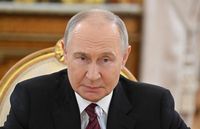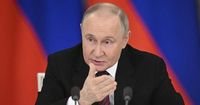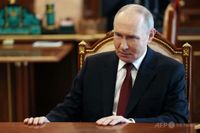On May 11, 2025, Russian President Vladimir Putin made a significant proposal for direct negotiations with Ukraine, suggesting that the talks be held in Istanbul, Turkey, on May 15, 2025. This announcement comes on the heels of a call from European leaders for a 30-day unconditional ceasefire starting May 12, 2025, aimed at facilitating peace discussions.
Putin emphasized during a press conference at the Presidential Office that the responsibility for resuming negotiations lies with Ukraine, stating, "We are ready for serious negotiations to eliminate the root causes of the conflict and begin moving towards a lasting and robust peace." He pointed out that it was Ukraine that had originally broken off negotiations in 2022, and he expressed a desire for talks to resume without preconditions.
In his remarks, Putin did not dismiss the possibility of agreeing to a new ceasefire during the upcoming negotiations, saying, "We do not rule out the possibility of agreeing on some new truce during these talks." This indicates a potential willingness to reach an agreement that could halt hostilities.
The backdrop to Putin's proposal includes a recent agreement among Ukraine and major Western nations, including the UK, France, and Germany, who urged Russia to accept a ceasefire that would last at least 30 days. If Russia fails to comply, these countries have warned of imposing significant new sanctions and increasing military support to Ukraine. Putin, however, did not directly address these warnings or the ceasefire proposal during his announcement.
Putin's call for negotiations marks a notable shift in the ongoing conflict, as direct talks between Russia and Ukraine have been stalled since the early months of the invasion in 2022. The Russian leader framed the upcoming discussions as a critical step towards achieving a sustainable peace, stating that a ceasefire must be observed by both parties to be effective. "A ceasefire that is observed by not only Russia but also Ukraine would be the first step towards a long-term, stable peace," he asserted.
On the same day, Putin was scheduled to meet with Turkish President Recep Tayyip Erdoğan to discuss the logistics of the proposed talks. The Turkish leader has often positioned Turkey as a mediator in the conflict, and this meeting could pave the way for a more structured dialogue between Russia and Ukraine.
Putin's remarks were made following a series of discussions with various heads of state who visited Russia for the 80th anniversary of Victory over Germany in World War II. He expressed gratitude for their support, emphasizing that true unity is essential for peace. He stated, "If there are those who truly desire peace, there is no reason not to support this proposal." This suggests that he is seeking to bolster international support for his initiative.
Despite the hopeful tone of Putin's proposal, skepticism remains regarding the sincerity of Russia's commitment to peace. Critics argue that previous ceasefire proposals from Russia have been undermined by continued military actions. For instance, during the recent 72-hour ceasefire declared by Putin coinciding with Victory Day, he accused Ukraine of launching large-scale attacks, a claim that Ukraine has contested, asserting that Russia continued its offensive operations.
Ukrainian President Volodymyr Zelenskyy has not yet publicly responded to Putin's proposal. However, he previously indicated a readiness to implement the unconditional ceasefire starting May 12, 2025, as agreed upon with Western allies. Zelenskyy's administration has consistently called for genuine efforts towards peace, but remains wary of Russia's intentions.
As the situation develops, the international community will be watching closely to see if this proposed dialogue leads to any meaningful progress in resolving the conflict. The potential for a ceasefire and renewed negotiations offers a glimmer of hope amidst the ongoing violence, but the path to peace remains fraught with challenges.
In summary, the proposed talks in Istanbul represent a critical juncture in the Russia-Ukraine conflict. While Putin's initiative could open the door to a new phase of dialogue, the realities on the ground and the history of broken promises cast a long shadow over the prospects for lasting peace. The coming days will be crucial in determining whether these negotiations will take place and what outcomes they may yield.






